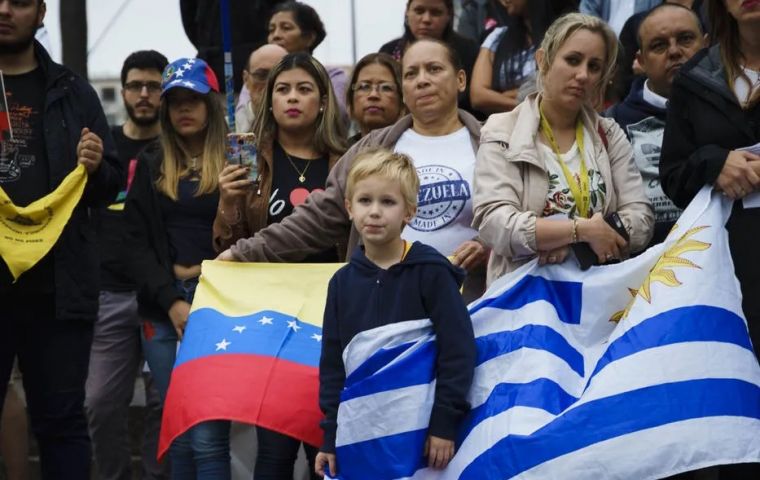MercoPress. South Atlantic News Agency
Uruguay issues decree to speed up admittance of Venezuelan asylum seekers
 Venezuelan nationals will be considered “in a different way, taking into account the reality of that country,” Paganini explained. Photo: Sebastián Astorga
Venezuelan nationals will be considered “in a different way, taking into account the reality of that country,” Paganini explained. Photo: Sebastián Astorga The Uruguayan Government issued a decree Wednesday expediting the admission of some 3,500 Venezuelan refugees into the country, Foreign Minister Omar Paganini announced in a press conference in Montevideo.
Paganini also explained that the initiative was welcomed by ”the UN Agency for Refugees (Acnur).“ In this new framework, applications from Venezuelan nationals will be considered ”differently, taking into account the reality of that country,“ the minister noted.
The decree allows that each case be studied ”in an accelerated manner, to go through the processes faster and thus be able to determine the refuge expeditiously,“ Paganini went on.
He also recalled that Venezuelan citizens can enter Uruguay as tourists without a consular visa, so this mechanism was only for those who are interested in political refuge and ”meet certain basic requirements to access this legal status.”
Paganini also pointed out that according to the new mechanism the phase of a personal interview with the applicant will be waived because it was one of the main reasons that slowed down the process.
Deputy Foreign Minister Nicolás Albertoni also noted that around 95% of the applications filed by Venezuelan nationals were approved.
There are now some 3,500 such applications to be processed by Uruguay's Refugee Commission (CORE) of the Ministry of the Interior while in 2016 there were only two. Venezuelans accounted for about 15% of the total asylum applications handled by the CORE.
Without the requirement of an interview, it is necessary to have documentation verifying Venezuelan nationality, as well as to have no criminal record in Uruguay, and no criminal record registered with Interpol, and no other residence permit granted in Uruguay, among others, it was also explained. Those who do not meet these criteria will have to go through with an eligibility interview.
The new measure came in the saga of the recent “residency by rootedness” created earlier this month for Cuban nationals and holders of other passports who do need a consular visa to enter Uruguay. “They enter as refugees, but they are not refugees, so this limbo is generated,” Paganini explained back then as some 20,000 migrants were given a speedier albeit “temporary” alternative to their process but would apply only to those “who have family or labor roots” in the country and may now renounce their asylum requests and apply for legal residency in one of the following three modalities: employment or self-employment (permanent), family roots (permanent), and training roots (temporary, renewable). In time, these people will also be eligible for Uruguayan citizenship.




Top Comments
Disclaimer & comment rulesCommenting for this story is now closed.
If you have a Facebook account, become a fan and comment on our Facebook Page!